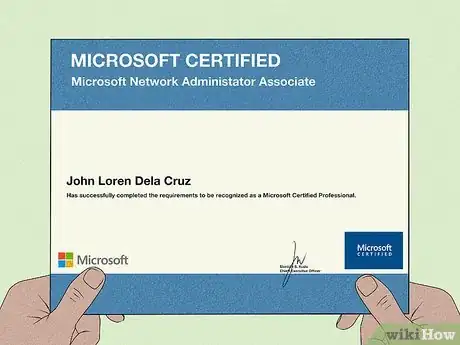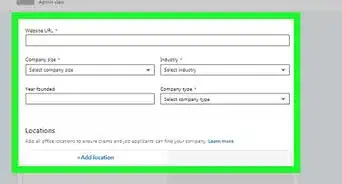This article was co-authored by Stan Kats. Stan Kats is a Professional Technologist and the COO and Chief Technologist for The STG IT Consulting Group in West Hollywood, California. Stan provides comprehensive technology solutions to businesses through managed IT services, and for individuals through his consumer service business, Stan's Tech Garage. Stan holds a BA in International Relations from The University of Southern California. He began his career working in the Fortune 500 IT world. Stan founded his companies to offer an enterprise-level of expertise for small businesses and individuals.
There are 15 references cited in this article, which can be found at the bottom of the page.
This article has been viewed 136,661 times.
Today’s workplace relies on computer systems. Without computers and networks, we would be unable to communicate or even complete very basic tasks – we would be paralyzed. Systems administrators keep the modern workplace going by maintaining and managing our computers and computer networks. As you might imagine, they are an essential and valuable cog in the global economy. But while there is good opportunity for work in the field, becoming a systems administrator is not easy. You will need specialized training and a wide skill set.
Steps
Building your Skills and Credentials
-
1Find out whether the field is right for you. A computer systems administrator’s biggest job is to keep an organization’s lines of communications open. On a given day you might have major hardware or software malfunctions to fix; you may have to rewire network cables; you may be pressed to work as fast as possible by frustrated people whose computer systems are paralyzed. None of this is easy or for the faint-hearted. On the other hand, you will be well-paid. Network administrators in 2013 made an average of $74,000, with the top earners bringing in nearly $120,000.[1]
- Other functions of the job include updating software and hardware, maintaining email and data storage, training new users on the system, connecting employee workstations to the network, and sometimes managing telecommunications networks for people working from home or on the road.[2]
- Do research before committing to a career in systems administration. There are many web resources that can give you a good summary, such as US News and World Report[3] or Computer Weekly[4]
-
2Do a bachelor’s degree. While sometimes it is possible to work in systems administration with previous experience or a professional certificate or associate’s degree, you will find that many employers prefer people with a bachelor’s degree. Doing a four year degree will familiarize you with things like programming, network security, operating systems, database analysis, and systems analysis, and systems design. Usually, you should do a computer-related major such as information or computer science.[5]
- Some college programs will include the chance to do an internship. This is a great chance to acquire on-the-job experience and industry skills while still in school. It will make you more hireable as a new graduate.
Advertisement -
3Consider further vocational training. As a way to increase your hireability and credentials, consider furthering your education past a four year degree. For example, companies like Microsoft, Red Hat, and Cisco offer vendor certification programs in things like programming, servers, applications, and databases.[6] While such certifications are voluntary, according to PC World 68% of hiring managers in the industry consider them to be “medium or high priority” in making hiring decisions.[7]
- You can also get certifications in Windows or Linux server systems, and there is high demand for Cloud and DevOps certifications.
- You should be able to find certification programs in a variety of places. Microsoft certification courses, for example, are sometimes offered in tech schools or community colleges. You can also take them through “Learning Partners” – trainers all over the country will prepare you for the certification exam.[8]
-
4Become familiar with a range of operating systems. Systems administrators have to know the ins and outs of major computer operating systems like Windows, Linux, Android, iOS, and others, in order to be able to make updates, install patches, do data backups, manage hardware, and monitor software and system performance. Cast a broad net. Familiarizing yourself with a range of systems – particularly the most popular ones – will make you flexible and more in demand.
- Some vendors, again, have certification programs in their operating systems. Check with companies to see whether they offer training.
-
5Develop communications skills. Communication is an underrated part of being a systems administrator. Yes, much of your time might be spent in alone in the server room, keeping things going. But you will have to work with others, as well. You will need to be able to express your expectations, to propose ideas, and to offer solutions to peers and to management. Can you convince your boss, for example, to upgrade the company’s web server? This requires skills in persuasive speaking.[9]
- Try talking in front of a mirror for 15 to 20 minutes every day. If you are more serious about improving your communication skills, join a speaking organization like Toastmasters International.[10]
Finding a Job as a Systems Administrator
-
1Get entry-level experience in Information Technology. Try to build up a background in the industry before or while you are in training. Working in desktop support or at a tech support helpdesk are common first jobs for people in systems administration. Try an internship as well. The important thing is to get your foot in the door. Make yourself more hireable by gaining practical experience on top of your academic training.[11]
-
2Look for administrator jobs. Candidates who have finished a training program or degree will find that there are a good number of entry-level positions in systems administration. Often employers will look for at least 3-5 years of experience, but you might be able to include education and internships towards this number. Be on the lookout for openings. Check websites like Linkedin or Monster. If you already work at an IT firm, be sure to spread the word to that you’re interested in the field. You may be invited to apply if an internal position opens up.
- Employers will often say what specializations they are looking for. They might want someone who works with Linux, for example, or RedHat. Carefully target the jobs that best match your skills. Highlight your certifications in specific programs or operating systems.[12]
-
3Apply. Now is the time to reach your goal! Once you’ve found some good openings, read the advertisements very carefully. Are you what they are looking for? Take note of the employer’s preferred qualifications and any desire for expertise in specific operating systems or other software. When you put together your cover letter and resume, highlight how your training and on-the-job experience meet the company’s needs.
- Say a company is looking for an administrator who specializes in Linux systems, and who has good knowledge of coding in Java and Perl. If you have the proper credentials, say so. Talk about how you have a certification in Linux, for instance, or how you Java and Perl and are also comfortable with other coding languages like Python.[13]
- As with all job searches, gear your cover letter and resume to the requirements of the job. Make it about the company and not about you. To get hired, you’ll have to show an employer how your skills can serve them.[14]
- After working in the field for a time, you should become qualified for more specialized positions. For instance, you might move into a managerial role, not just managing systems but deciding if and when to make changes or upgrades to the company’s computer system.
-
4Join a professional organization. There are several major professional organizations for systems administrators, like the League of Professional Systems Administrators (LOPSA) and LISA. Joining a group like one of these can be a wise career move. LOPSA, for example, offers benefits like professional support, opportunities for continued education, and professional networking, and gives a voice to the profession as a whole through lobbying efforts and public outreach.[15]
-
5Stay up to speed on the latest technology.[16] Systems administrators sink or swim by their knowledge of the latest advancements or changes in technology. You will need to stay current in the field, otherwise you risk becoming outdated. Read reviews in computer magazines; follow professional online discussion forums or listservs; network and stay in touch with your peers. You might also consider a Master’s degree in the field, which will give you even more specialized training.[17]
Community Q&A
-
QuestionHow do I develop myself as a systems administrator?
 Community AnswerTraining to become a systems administrator isn't the hardest thing in the world to do. Get familiar with Windows server 2008-2012. I say Windows because it's a surefire bet that most companies use it some way or another. You can train yourself in Windows server with VirtualBox and actual Windows OS downloaded from Microsoft website itself. Learn how to create a domain, group policies, securities, share drives, and so on. If you can, ask a systems admin about what he/she does from day to day. You'll get some insight on what to study and how to implement it!
Community AnswerTraining to become a systems administrator isn't the hardest thing in the world to do. Get familiar with Windows server 2008-2012. I say Windows because it's a surefire bet that most companies use it some way or another. You can train yourself in Windows server with VirtualBox and actual Windows OS downloaded from Microsoft website itself. Learn how to create a domain, group policies, securities, share drives, and so on. If you can, ask a systems admin about what he/she does from day to day. You'll get some insight on what to study and how to implement it!
References
- ↑ http://money.usnews.com/careers/best-jobs/network-and-computer-systems-administrator
- ↑ http://silverwraith.com/blog/2011/07/so-you-want-to-be-a-systems-administrator/
- ↑ http://money.usnews.com/careers/best-jobs/network-and-computer-systems-administrator
- ↑ http://www.computerweekly.com/photostory/2240205822/How-to-become-a-system-administrator/1/System-administrator-Job-description
- ↑ http://study.com/articles/How_to_Become_a_System_Administrator_Career_Roadmap.html
- ↑ https://www.microsoft.com/en-us/learning/certification-overview.aspx
- ↑ http://www.pcworld.com/article/209227/it_certifications_that_matter_for_helpdesk_tech_support_pros.html
- ↑ http://www.microsoft.com/en-us/learning/mta-certification.aspx
- ↑ http://www.internap.com/2013/04/10/5-best-practices-for-successful-system-administration/
- ↑ https://www.toastmasters.org/
- ↑ http://silverwraith.com/blog/2011/07/so-you-want-to-be-a-systems-administrator/
- ↑ http://study.com/articles/How_to_Become_a_System_Administrator_Career_Roadmap.html http://www.computerweekly.com/photostory/2240205822/How-to-become-a-system-administrator/1/System-administrator-Job-description
- ↑ http://career-advice.monster.com/resumes-cover-letters/Resume-Samples/sample-resume-systems-administrator-entry-level/article.aspx
- ↑ https://uhr.rutgers.edu/worklife-balance/life-events/layoff-information/preparing-resume-and-cover-letter
- ↑ https://lopsa.org/AboutLOPSA
- ↑ Stan Kats. Cybersecurity Expert. Expert Interview. 27 October 2021.
- ↑ http://study.com/articles/How_to_Become_a_System_Administrator_Career_Roadmap.html
About This Article
If you want to become a systems administrator, a job that involves fixing and maintaining computer systems, start by becoming familiar with a range of operating systems like Windows, Linux, and iOS to help you become the most desirable candidate for hire. If you don’t already have a degree, consider getting a computer-related bachelor’s degree. Additionally, you can sign up for a vendor certification program through companies like Microsoft and Cisco to get specialized training in things like programming, servers, and databases. For more tips, like how to get entry-level experience in Information Technology, read on!







































































